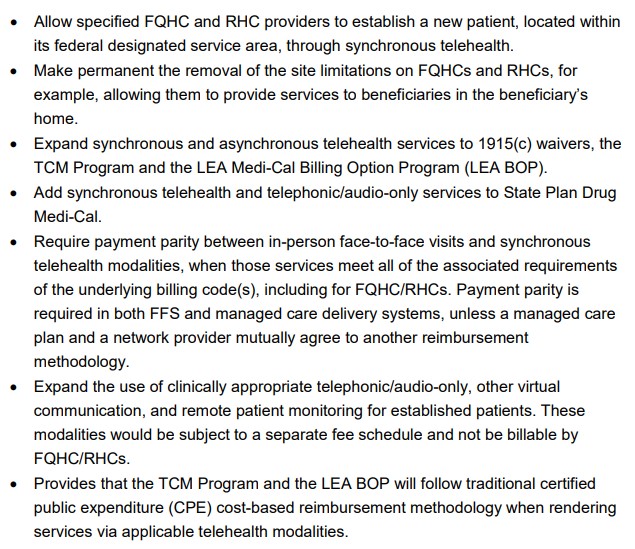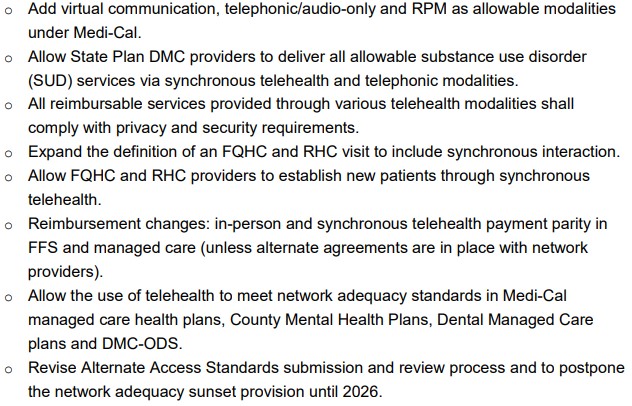California DHCS releases telehealth policy proposals for post COVID-19
The Department of Health Care Services (DHCS) released it’s post-COVID-19 telehealth policy proposals on Tuesday. These proposals include the expansion of telehealth services, requiring payment parity for telehealth services, expanding the use of audio-only care and many more proposals.
When the COVID-19 pandemic was declared a public health emergency, the collective provisions like the CARES Act, FFCRA and other federal waivers and flexibilities were designed to help states swiftly respond to the public health crisis. So while DHCS had existing telehealth policy before the pandemic, they implemented flexibilities to help Medi-Cal delivery systems to meet the needs of beneficiaries.
These temporary policy changes included expanding the ability of providers to provide applicable Medi-Cal services through telehealth, allowing telehealth for new and established patients, allowing covered services to be provided through audio-only visits for the first time, allowing payment parity between in person visits and telehealth visits, waiving site limitations for providers and patients and allowing for expanded access to telehealth through non-public technology platforms.
For a post-COVID-19 world, DHCS is proposing allowing the continuation of Medi-Cal covered benefits and services being provided through telehealth. In the proposal, DHCS said that they believe they are providing a reasonable and balanced approach to the continuation of telehealth after the public health emergency is over.
“While the recommended changes will not incorporate all of the flexibilities allowed for during the COVID-19 PHE [public health emergency], DHCS believes its recommended approach is both reasonable and balanced in terms of promoting appropriate standards of care, providing access to quality health care services and helping to advance equity in availability of modalities across the delivery systems.”
The department said the policy changes were guided by principles such as equity, access to care, standard of care, patient choice, confidentiality, stewardship and payment appropriateness. They also said that for this policy they had to take into account Health Insurance Portability and Accountability Act (HIPAA) privacy rules protecting patients’ health information. The services used by providers must be HIPAA compliant.
The policy recommendations that DHCS is looking to have in place by July 1, 2021 are: 
Image: California Department of Health Care Services
These policy proposals are included in the governor’s 2021-2022 budget, which provides $94.8 million total funds ($34.0 million from the General Fund) to implement remote patient monitoring as an allowable telehealth modality in fee-for-service and managed care delivery systems.
They have also included Trailer Bill Language (TBL), effective July 1, 2021. The TBL includes:
Image: California Department of Health Care Services
The DHCS will also submit state plan amendments to the Centers for Medicare and Medicaid Services for the necessary federal approvals. They also plan to amend the existing 1915(c) Home and Community Based Services Waivers to allow for telehealth.
The department will also be developing and issuing policy guidance through the 2021 calendar year, and engaging stakeholders when appropriate.
However, DHCS will not recommend the continuation of all of the allowed flexibilities that were established during the public health emergency. These include audio-only telehealth as a billable visit for Federally Qualified Health Centers (FQHCs) or Rural Health Centers RHCs reimbursed at a prospective payment system rate, audio-only telehealth as a mode to establish a new patient as a billable visit.
The department also did not recommend the continuation of the payment parity for audio-only telehealth and virtual communications. They are not recommending the continuation of various temporary COVID public health emergency flexibilities for Tribal 638 clinics because the federal government sets policy for Indian Health Services. Instead they will revert to pre-public health emergency policies.
The department said that they are open to future discussions with stakeholders on the use of the discontinued telehealth services and says they are open to being flexible.
“DHCS recognizes the value of being flexible in the use of telehealth across the health care safety net, while protecting the integrity of the Medi-Cal program from a health care quality and fiscal perspective.”

